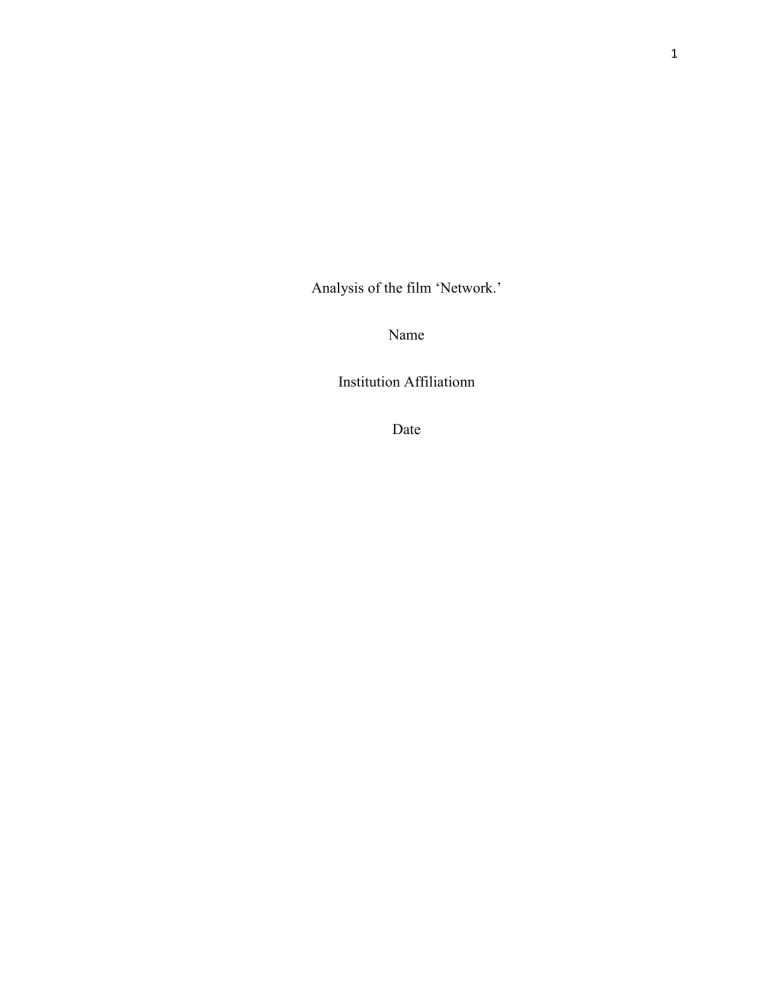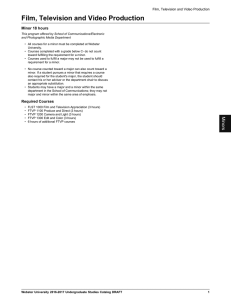
1
Analysis of the film ‘Network.’
Name
Institution Affiliationn
Date
Question 1: Sunject Matter
The film's subject matter is on news and television. It depicts a television and news sector as
characterized by selfish and controlling individuals. The controlling nature of the major
stakeholders in the television and media industry at that time made the viewers feel disrespected;
the viewers had no power over television content. The controlling nature of the media bosses can
also be seen towards their employees, like is the case of Howard, who, even after popularizing
the media house, is subjected to scrutiny.
Question 2:Main Themes
Capitalism and corruption and freedom of speech are some of the primary themes. On
Capitalism, Arthur Jensen, chairman of the fictional corporation, says, "There is no America.
There is no democracy. There is only IBM and ITT and A T and T and DuPont, Dow, Union
Carbide and Exxon." Jensen criticized the newsrooms for their tendency to promote their brands
instead of broadcasting reliable news, which the people trusted them to provide. The statement
implied the people of the United States had lost control over the television content, and they had
no power to change it.
A considerable number of characters in the film becomes corrupted during its course. After the
loss of his wife, Howard's mindset is corrupted with alcohol and sadness. Diana, the program
executive, is corrupted throughout the film. Her desire for higher rates compels her to do
anything, even taking advantage of others' misfortune. Frank Hackett's ethical morals are
corrupted; his only interest is profit. He also fails to notice Beale's downfall, only seeing his
inability to make his organization profitable.
Beales's journey to fame in television started with his speech, where he spoke his heart out. He
expresses his thoughts on how few privileged people in the society wielding power over others.
His sentiments were helped by the rest of the American people but due to political atmosphere at
that time could not speak out. Beales' outrage eventually led to him being assassinated.
Question 3: How is the subject matter critical?
The subject matter of the film is critical in delivering the film's main idea. The director brings
out matters affecting television and media industries as well as in the society at large. Through
the subject matter, topics such as corruption, capitalism, and aspiring programmers are brought
to the attention of the viewers.
Question 4: Context of the Film
The film is set in a context where conglomerate networks were taking over the face of the
television network. At the time of its production, the mode of broadcasting news was seen to be
prioritizing profits than the production of quality news; the media houses focused more on
appeasing their shareholders. The film was contrasting the then news media industry to the
1950s, which had balanced content.
Question 5: Personal observation and Opinion
I think the film accurately predicted the current situation in the media sector. In my opinion,
today's media corporation is a reflection of the main idea of the film, where the media is more
into branding than the original purpose of television, informing, and educating. I also find the
director's use of satire is fascinating. For instance, Diana is preoccupied with high rated
programmers. She will stop at nothing to get a higher rating for her programs. She eventually
compels other senior employees to call for the murder of Howard after his show's popularity
reduced.
Question 6: Advancements in the film
Aspects of advancements that can be identified from the film include telephones, computer-aided
broadcasts, and colored television sets.
References
1976}, N. (2020). Network { 1976}: Free Download, Borrow, and Streaming: Internet Archive.
Retrieved 6 May 2020, from https://archive.org/details/Network1976
Palmer, L. (2020). ‘Network’ Turns 40: Here Are 3 Ways It Changed How We Understand News
Media. Retrieved 6 May 2020, from https://www.indiewire.com/2016/12/networkanniversary-news-media-1201750526/




